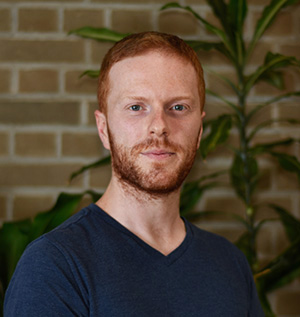The Arnold and Mabel Beckman Foundation has awarded a $600,000 grant to Timothy Johnstone, assistant professor of chemistry and biochemistry at UC Santa Cruz, through its Beckman Young Investigator Program.
The grant will fund a new project to develop alternatives to the use of precious metals such as platinum and palladium for catalyzing important reactions. Precious metals play essential roles in catalysts for many of the chemical transformations involved in industrial processes ranging from fuel production to the synthesis of pharmaceuticals. These transition metals have many useful properties but are relatively rare and expensive.
Johnstone’s group has discovered new types of chemical bonds and molecular structures that can endow more abundant elements like antimony, bismuth, tin, and lead with the kind of reactivity that could make them useful as catalysts.
“Transition metals inherently have diverse and complex reactivity, but there is increasing recognition that other elements on the periodic table can do equally interesting chemistry,” Johnstone said. “You have to work for it more and build the right molecular structure to activate them. But being able to use more Earth-abundant elements would be more economical and more sustainable.”
Johnstone’s interest in this area began when his lab was studying the chemistry of certain drugs with antimony in them. “We came to realize there were fundamental gaps in our understanding of the chemistry of antimony, and we noticed previously unexplored types of bonds between antimony and oxygen, called terminal oxo bonds,” he said. “As a molecular motif, these heavy element terminal oxo bonds are fundamentally interesting, and they can mediate interesting reactions.”
Johnstone’s lab succeeded in isolating the first monomeric stibine oxide and is now investigating the kinds of chemistry that can be done using such compounds. The ultimate goal of the project is to develop more sustainable alternatives to the use of precious metals as catalysts. But much of the work involves exploring the fundamental chemistry of these novel chemical structures.
“I very much appreciate the Beckman Foundation for funding a project that is quite fundamental in nature,” Johnstone said. “Although we might be interested in this chemistry for catalytic purposes, once we have identified new bonding motifs and understand new reactions, that’s a whole new section in the textbook and a new set of building blocks that chemists have at their disposal for all kinds of applications. That’s the value of this kind of fundamental research—it generates new knowledge that everybody has access to.”
The Beckman Young Investigator Program provides research support to the most promising young faculty members in the early stages of their academic careers in the chemical and life sciences, particularly to foster the invention of methods, instruments, and materials that will open up new avenues of research in science.



